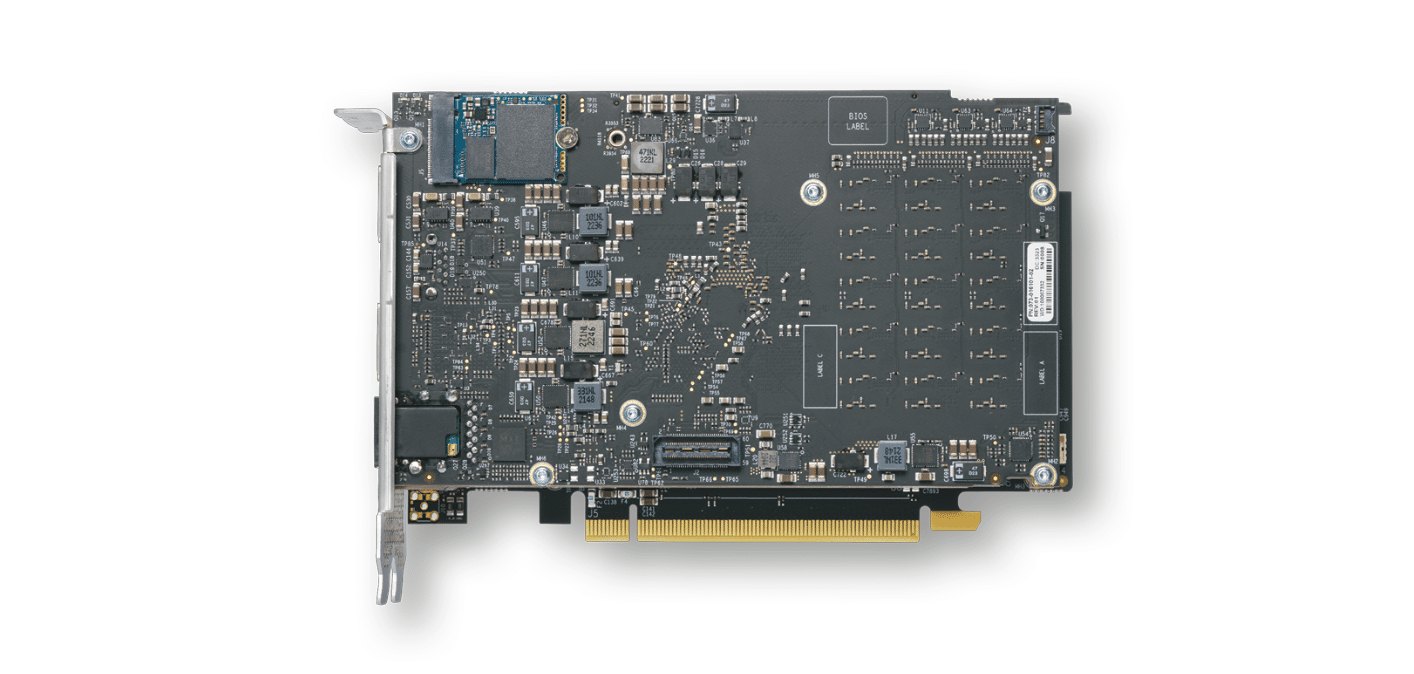F2070X Infrastructure Processing Unit (IPU)
2×10/25G, 8×10/25G, 2x100G
Powerful Intel®-based Infrastructure Processing Unit (IPU)
The Napatech F2070X Infrastructure Processing Unit (IPU) is a 2x100Gbe PCIe card with an Intel Agilex® AGFC023 FPGA and an Intel® Xeon® D SoC. The unique combination of FPGA and full-fledged Xeon CPU on a PCI card allows for unique offload capabilities. Coupled with Napatech software, the F2070X is the perfect solution for network, storage and security offload and acceleration. It enables virtualized cloud, cloud-native or bare-metal server virtualization with tenant isolation.
Customization on demand
The F2070X uniquely offers both programmable hardware and software, to tailor the IPU to the most demanding and specific needs in your network, and to modify and enhance its capabilities over the life of the deployment. It is based on the Intel Application Stack Acceleration Framework (ASAF) that supports the integration of software and IP from Intel, Napatech, 3rd parties and homegrown solutions. This one of a kind architecture enables hardware performance and the speed of software innovation.
Scalable platform
The Napatech F2070X comes in a standard configuration, and includes support for several combinations of Intel® FPGAs, Xeon® D processors, and memory. This enables tailored platform configurations matching requirements for specific use cases.
Compatible Software
Link-Storage™ Software
Maximizes the performance of data center storage based on NVME over TCP (NVME/TCP).
Link-Security™ Software
Maximizes the performance of data center security based on Transport Layer Security (TLS) encryption.
Link-Virtualization™ Software
Maximizes the performance of data center networking for Infrastructure-as-a-Service platforms.
Watch video by NextGenInfra where Charlie Ashton, Senior Director of Business Development from Napatech explains how
Infrastructure Processing Units (IPUs) promise big gains in efficiency for data center operations.
F2070X IPU
Compliance
Napatech upholds the highest quality, environmental and safety standards, and complies with all applicable regulations across regions. This helps our customers to realize a seamless integration without delays – and ensures error-free operation throughout the product life cycle.
Ethernet Front Port Compliance
The IPU design maximizes mechanical and electrical front port margin, securing trouble-free operation with the optical or electrical modules of the customer’s choice.
The thermal design is validated dissipating the maximum power level as standardized for the given form factor. Margin on the data interface has been optimized tuning the equalization parameters of the transceivers hosting the front port channel, maximizing EYE margin to the relevant standard.
EMC Compliance
All Napatech designs have passed EMC compliance testing for major regions, including Europe and North America. By ensuring compliance as an integral part of the design, the risk of delays is eliminated. Moreover, the EMC testing has been performed in a mainstream server, potentially directly applicable to the use case.
Environmental Compliance
The end product (server + installed IPU) must adhere to regional environmental legislation. To enable trouble-free server integration, Napatech IPUs are manufactured using only materials that fully comply with the current RoHS, REACH and proprietary Tier 1 legislation.
Full compliance from early inception eliminates the risk delays and product withdrawal due to authority intervention.
Event Handling & System Monitoring
In order for the IPU to become an integral part of the server environment and maximize uptime, it needs to monitor and expose key performance metrics to the application during operation. Napatech IPUs monitor the following metrics:
- Hot spot temperatures
- Key supply voltages and currents
- PCI protocol events
- General system events
PCI Compliance
With the PCI interface on the IPU dictated by the server plane, the hardware maximizes mechanical and electrical PCI margin, ensuring trouble-free operation in the server and server slot(s) of the customer’s choice. All designs have passed relevant PCI-SIG tests and have been adopted on the PCI-SIG integrators list.
Safety Compliance
To enable trouble-free server integration, Napatech IPUs are fully compliant with all applicable safety standards.
By ensuring safety compliance as an integral part of the IPU design, the risk of delays is eliminated. Compliance testing is performed in a mainstream server, potentially directly applicable to the use case.
Conflict Minerals Compliance
To ensure quick and trouble-free server integration, Napatech IPUs are manufactured using only materials that fully comply with the relevant Conflict Mineral Legislation. For US based IPU integrators, this facilitates submission of the mandatory Conflict Mineral report to SEC.
Shock & Vibration Robustness
Many server environments expose the IPU to substantial shock and vibration, predominantly during the transportation phase. To ensure trouble-free server integration and operational robustness throughout the product life cycle, validated design aspects include:
- Cooling enclosure for superior mechanical stiffness
- Key exposed components are under-filled (glued) to the PCB
- Shock robustness validated against JESD22-B110A
- Vibration robustness validated against ASTM D4169-09
Feature Highlights and Specifications
| FPGA Device and Memory |
|
| SoC Processor and Memory |
|
| PCI Express Interfaces |
|
| Front Panel Network Interfaces |
|
| Supported Compute and Memory Devices (Mount Options) |
|
| Size |
|
| Power and Cooling |
|
| Time Synchronization (Mount Options) |
|
| Board Management |
|
| SoC Processor Operating System |
|
| Supported Host Processor Operating Systems |
|
| Environment and Approvals |
|
| Application Stack Acceleration Framework (ASAF) |
|
| Open vSwitch (OVS) Offload |
|
| Storage Offload |
|
| Security Offload |
|
| Supported Hardware and Transceivers |
|

